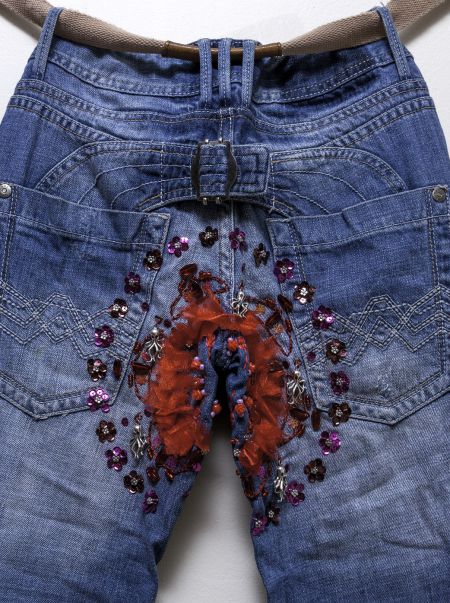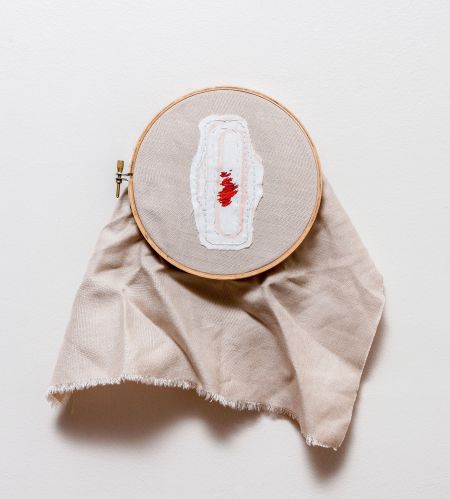KJIPUKTUK (Halifax) - For most people, if they think about it at all, it’s something they think about once a month. And when Alanah Correia started the Our Bodies Our Blood art project, her original intention, she says, was to get people talking publicly about something normally considered so private.
It wasn’t until she expanded the project to include a drive to raise funds and tampons for local women’s shelters that the full importance of a project dedicated to menstruation started to strike a chord.
“I’ve had a lot of discussions around this project with different people I’ve met,” she says. “They couldn’t really connect with how menstruation is important. And then when I brought the donation drive in, people can connect the dots and see how menstruation can be difficult for some people who can’t access those products.”
On some level, it would seem that the federal government agrees; on July 1st, the GST was removed from tampons and other menstrual products in a move that NDP MP Irene Mathyssen, one of the sponsors for a private member’s bill addressing the tax, called it ‘a victory for all women’ (a victory, it should be noted, that had long since been won for such apparent necessities as condo fees, cocktail cherries and edible cake decorations). Nova Scotia introduced an HST rebate on tampons back in 2010.
But while tampons and other menstrual products are no longer taxed as a luxury, they’re still priced like one – averaging 20 tampons a period, or 9,600 over a lifetime, menstruation costs roughly $2400 – and continue to tax the budgets of many of those who menstruate, particularly people who are homeless or on income assistance.
“We have to have a supply of tampons the same way we have to have a supply of cereal,” says Kathy McNab, Fund Development and Communications officer at Adsum house.
In Adsum’s crowded subterranean storeroom, personal care items are piled to the ceiling. But while there are several boxes of menstrual pads – which McNab says are more frequently donated but not regularly in demand – there are very few tampons.
The shelter gets donations of other necessities, such as food, from Feed Nova Scotia, but the food bank doesn’t provide personal care items, and any money to buy them comes out of Adsum’s annual budget. These are products in demand not only by Adsum’s residents, says McNab, but also the members of the community who come to the shelter’s door seeking necessities.
Donations to the drive will also go to Barry House. Colleen Ritchie, Communications and Fund Development Specialist at the shelter, says that while the 600 women who stay at Barry House’s two locations annually would never go without the products they need, the money to buy them comes out of the overall budget, meaning any donations free up funds to be spent elsewhere.
“We will always make sure that it is provided but it does tax our budgets so every donation in kind that we receive is a great gift.”
Although the drive might only provide supplies for a few weeks, the act of making menstruation front and centre could get to the root of why tampons aren’t getting donated to shelters in the first place.
“I think that this drive is happening is a reminder,” says Ritchie, adding that part of this is dropping the euphemisms around menstruation – calling it ‘feminine hygiene’ when we’re really talking about tampons doesn’t help, she says – and recognizing that even allowing that menstruation is a personal experience, “there’s a fine line between privacy and disempowerment.”
And while it isn’t necessarily stigma around menstruation that the drive needs to help us collectively get over, says McNab, the drive nonetheless acts as a starting point for a broader conversation about the hidden ways that poverty affects women.
“It’s just getting the word out to starting to think about homeless people, starting to talk about homeless women, because women don’t talk about being homeless like men,” she says. “We’re also talking about the inadequacy of the Community Services budgets, that [women] are not able to get these items that are essential.”
The drive’s starting point – the Our Bodies Our Blood art project – will be showing work at Plan B gallery through the month of September. Correia says she’s been surprised by the level of interest in the project, with works coming in from as far away as Australia and Europe.
But even after the focus shifts away from raising the supplies needed for menstruation to showing artwork devoted to it, the drive will continue to accept donations, drawing attention to the unconsidered aspects of menstruation – and serving as a reminder of how something as innocuous as a tampon can have an important impact.
“It’s becoming something that connects to a lot of different things like environmental issues, social issues, political issues,” says Correia. “It just keeps going and going the more you dig into it.”
Donations can be dropped off at Plan B at 2180 Gottingen until the end of September, and the crowdfunding campaign for the drive is here. Any questions can be directed to ourbodies-ourblood.net.




